Rock Holmes: Transformation – Part 1: CHILDHOOD
Rock Holmes: Transformation – Part 0: INTRODUCTION
Rock Holmes: Transformation – Part 1: CHILDHOOD
Rock Holmes: Transformation – Part 2: TRANSFORMATION
Rock Holmes: Transformation – Part 3: RESOLUTION
Rock Holmes: Transformation – Part 4: AFTERLIFE
Rock Holmes (1949-1965)
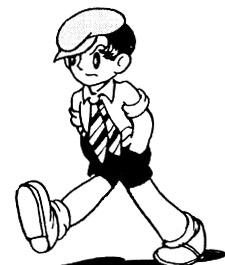
Boy Detective: Rock Holmes
Section 1: BOY DETECTIVES
Detective Boy Rock Holmes (少年探偵ロック・ホ-ム) began serialization October 1st 1949, only a few weeks after the October 15th publication of Metropolis. The name “Rock Holmes” (ロック・ホ-ム pronounced Ro-ku Ho-me) came from the Japanese pronunciation of Sherlock Holmes, “She-ro-ku Ho-me.” As Tezuka explains in the introductions to Lost World (1948) and Nextworld (1951), in this early stage of his career his stories tended to focus on ‘boy hero’ characters like Kenichi and Shinichi, and a later creation, Astro Boy. These virtuous, innocent but intelligent young boys could serve as alter-egos for the boy readers who made up a large part of his target market. Usually aged fourteen or younger, these virtuous and innocent adventurers were usually explorers, detectives or journalists, often apprentices assisting a father or uncle.
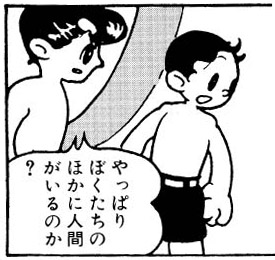
Boy Detectives: Rock & Kenichi
Kenichi was the first of these, appearing first under the name Pete, the boy hero of Tezuka’s first published work New Treasure Island and starring in both Lost World, and Metropolis, the two science-fiction adventures which in 1949 established science-fiction as Tezuka’s primary early genre. In all these stories Kenichi encounters great evil and villainy, and witnesses murder, betrayal and worse, but he remains innocent and heroic.
Though Rock was the same age and style as Kenichi and other boy heroes, from the start he was distinguished from the others by what the official Tezuka character encyclopedia calls a capacity to understand evil. Over the course of his adventures in Detective Boy Rock Holmes (1949), Nextworld (1950), Road to Utopian Lurue (1951) and Adventures of Rock (1952-54), Rock repeatedly encounters evil, violence, intolerance, slavery, murder, war and other extremely dark social forces. Unlike the other boy heroes, he does not come through these experiences innocent and untouched, but is transformed by his bitter experiences, coming to recognize the fact that the morally good course of action is not always the best way to achieve one’s ends. Rock is effectively a malleable character, while the other boy heroes are unwavering.
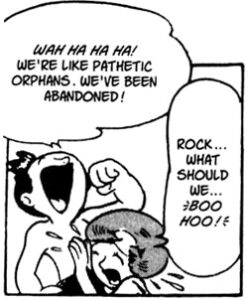
Rock has a good laugh
This is not to say that Rock is exactly the same as Kenichi and the other boy heroes before his transformation. Rock is always a little more selfish, a little less friendly, less trusting, more determined to have his own way and less willing to sacrifice himself for others, but the differences are small at the beginning. It is only as they experience the harsh realities of war and suffering that these small differences develop into opposing choices, and opposing plans for the future.
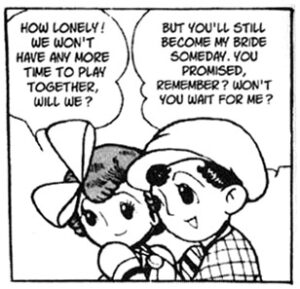
Rock and his fiancee
The contrast between Rock and Kenichi was first strongly established in Nextworld (1951), where Rock and Kenichi begin the story as boys of the same age from the same city. Both are caught up in war, both a war between different human nations and struggles between humans and the newly-developed race of Fumoon. Both boys are dragged far from home, imprisoned, betrayed and nearly killed on numerous occasions. Nonetheless, Kenichi emerges from his experiences just as pure as when he began, always pleading for peace and friendship, and resisting hopeless odds through non-violent methods. Rock, meanwhile, after enduring military indoctrination, torture and slavery, becomes bitter, hardened, and ruthless. When both are prisoners of the Fumoon, Kenichi tries to escape by organizing his fellow captives to escape together, while Rock refuses to help or trust in others, and escapes on his own across the desert. His former fiancée insists on following him, and while early in the book we had seen them share a very tender relationship, in her desperate desert thirst he offers no more comfort than the order, “Drink your tears.”
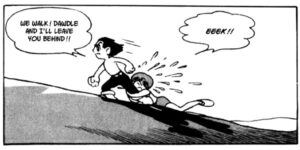
Rock in the desert
Nextworld is a difficult text to interpret because close to half the work is lost. Of the original 300 page manuscript, 150 pages were cut by the editors without Tezuka’s consent, and the original drawings have since been lost or given away to fans, making it impossible to reconstruct the complete story. Tezuka indicated that much of the missing material dealt with Rock’s trials as he is jailed for a crime he did not commit and, to get out of prison, agrees to train and serve as a spy in the war between Russia and Japan. In the original draft, Rock’s training and military indoctrination were rendered in detail, but we retain only the final stages of his training, as he is taught to fly wearing a bird suit, and the second half of his transformation, when he is captured on his first mission and enslaved.
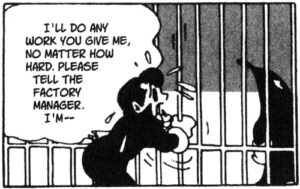
Rock in prison
At the beginning of his imprisonment, Rock is another pleasant boy, good enough to get along with Higeoyaji as well as Kenichi usually does, but the moment of final rupture comes during an escape attempt when he seems to be betrayed by his fiancée (though actually by an enemy girl who looks like her) and is punished by spending several weeks as a “caged bird,” locked in a barren cell without entertainment or human contact. It may seem trite to say that Kenichi stays pure through the power of friendship while Rock turns dark after betrayal and solitude, but the darker implications of this theme will become apparent as Tezuka develops it over the next few decades.
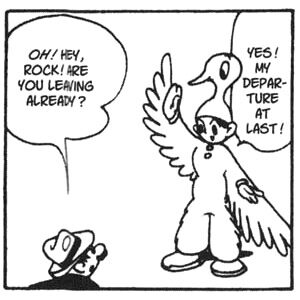 Kenichi would be followed by many other Tezuka boy heroes, including the eternal favorite of all boy heroes, Astro Boy. They all differ one from another, but all insist on making friends in all circumstances, with humans, robots, aliens and enemies, and insist that friendship will persevere, even when it won’t. In Nextworld and Metropolis war and death are not prevented, no matter how desperately Kenichi clings to friendship, and while he himself may remain pure, the world around him is devastated, and even his Fumoon friend destroyed because of her friendship for him. Rock, who rejects the ideal of impossible friendship and is willing adopt any means necessary to preserve his own life and his species, has, perhaps, made the wiser, if more selfish, choice.
Kenichi would be followed by many other Tezuka boy heroes, including the eternal favorite of all boy heroes, Astro Boy. They all differ one from another, but all insist on making friends in all circumstances, with humans, robots, aliens and enemies, and insist that friendship will persevere, even when it won’t. In Nextworld and Metropolis war and death are not prevented, no matter how desperately Kenichi clings to friendship, and while he himself may remain pure, the world around him is devastated, and even his Fumoon friend destroyed because of her friendship for him. Rock, who rejects the ideal of impossible friendship and is willing adopt any means necessary to preserve his own life and his species, has, perhaps, made the wiser, if more selfish, choice.
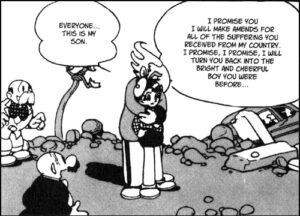
Rock gets adopted
At the end of Nextworld, when the wars are over and the world faces the beginning of the long process of recovery, Duke Red adopts Rock, promising to try to restore him to the happy, Kenichi-like boy he once was. This is far from the only father-son relationship between Duke Red and Rock, but it seems to be the most direct source of Rock’s role in the Metropolis movie as a solitary, military-minded boy adopted by Duke Red after a war, making the Metropolis movie an effective sequel to Nextworld As a matter of fact, Duke Red will be Rock’s father in at least five other stories, possibly more, since after a time Rock will be so firmly established as always the son of a wealthy and well-connected businessman and politician, that in some stories (for example Black Jack #83, “Rats in a Sewer) it is enough to say that Rock is a rich man’s son for one to assume Duke Red is the father.
Section 2: ADVENTURES OF ROCK
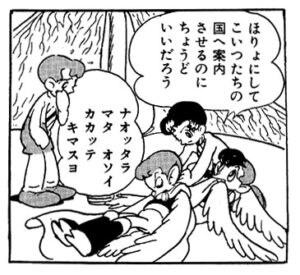
Epooms: the bird people
The most important manifestation of Rock Holmes the boy adventurer is in Adventures of Rock (Rock Monogatari) (1952-54; not available in translation). This story is a treatment of the conflict when two different intelligent races make first contact, a theme Tezuka used many times throughout his works to explore racial conflict, and which can be seen in many of his early science-fiction, stories, including Zero Men, Captain Ken, Astro Boy, and Nextworld. In Adventures of Rock the boy Rock leads the exploratory space mission to a newly-discovered populated planet. Though technically a children’s story, this is an extremely dark tale, with war, slavery, attempts at genocide, and nuclear and biological warfare, with Rock caught at the center of it.
The new planet has two resident races, a race of Epooms, or bird people (whose winged design is remarkably similar to the bird suit Rock used to fly for his spy mission in Nextworld), and a race of Luborooms, clay people, who, on meeting new people, polymorph to take their forms, and on first meeting Rock all take on his form. The theme of transformation, including specifically transforming one’s self into Rock, will become one of the strongest themes in the middle part of Tezuka’s career, but for now it takes a back seat to the primary topic of the inevitability of war in first contact situations. The clay people are slaves of the bird people, who possess a roughly medieval level of technology at the point of first contact. Rock adopts and raises a young bird boy as an effective younger brother or son; he teaches him not only reading and writing but the use of fire, an indispensable tool which accelerates Epoom technological development from primitive to modern in a short time. Tensions between humans and the newly powerful Epoom are already high when it is discovered that the Epoom home world possesses oceans of crude oil, and the tempting resource leads quickly to exploitation, the enslaving of the Epoom, and war. Here again the young explorer Rock is forced to become a soldier, fighting to prevent the slavery of the Epoom and the extermination of humanity as the Epoom attempt to defend themselves with biological warfare.
This degeneration from first contact to war is explored over and over in Tezuka, with the Fumoon in Nextworld, the Zero Men in Zero Men, the Martians in Captain Ken, and the conflicts between humans and robots in Astro Boy, where the struggles of robot rights activists and revolutionaries serve to introduce child readers to concepts of racism and racial strife. In Phoenix first contact situations become even stronger as political commentaries when inter-species wars are treated in direct parallel to the wars of conquest waged by primitive human societies, and the world wars of the 20th century. Late works like Adolf treat precisely the same subject without the mask of science fiction, giving adults the grim real-world version of the lesson they learned for the first time in these early boy adventure stories, that when two different races come in contact it is almost impossible to avoid war.
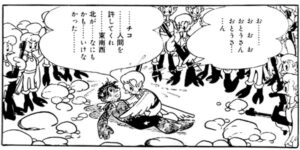
The Death of Rock Holmes
Adventures of Rock, predating Astro Boy is vital as one of the first of these war stories. In Metropolis and Nextworld we already saw Kenichi cling desperately to his friendship with the robot Mitchy (Tima) and the alien Fumoon, and fail to prevent war and suffering. Now, in Rock’s adventure, he remains friends with his adopted Epoom brother, takes up arms and tries to prevent the conflict, but fails and is struck down by gunfire in the battle he came to prevent. Dying in his foster bird-son’s arms, he declares with his last breath that peaceful coexistence is impossible, and that the only way to end the violence is for two sides to separate, each going back to their home worlds and pretending the other does not exist. This is a pessimistic but realistic solution which Kenichi, with his dream of universal friendship, would never accept.
Section 3: TRUER HERO: ASTRO BOY
At the same time that he wrote Adventures of Rock Tezuka began the first Astro Boy manga. Astro is the ultimate manifestation of Kenichi’s determination to cling to peace and friendship, declaring that he wants to be a friend to all humans, no matter how many times they attack him or his friends, or try to oppress or enslave robots. Astro’s world is, in effect, the exception, the one time first contact did not turn into open war, as it does in so many other Tezuka sci-fi stories.
But neither is Astro entirely successful. Astro would never accept Rock’s solution of the two races separating, and resolutely opposes the creation of a separate robot homeland. At the same time, however, Astro’s struggle never becomes easier, and the threat of war and mutual destruction, which separation could solve, never ceases. Indeed, as we learn in the second portion of the manga when Astro goes back in time to before the robot rights act was passed, robots only enjoy their current level of freedom and rights because aliens, grateful to Astro for saving them, threatened to exterminate humanity if they did not grant the robots rights (“Living Mould from Outer Space” and “Declaration of Robot Rights” – US volume 8). Thus if Astro’s first contact has not degenerated into war like all the others, peace is maintained only at the point of a gun, and with Astro himself still in constant battle.
Astro is the great hero of the Tezuka corpus, much more so than Kenichi. We admire Astro’s bravery, his innocence, his eagerness to learn, his dedication to friendship, and we cling to the hope that, with a true hero like Astro, universal friendship is finally possible.
Astro is the great hero of the Tezuka corpus, much more so than Kenichi. We admire Astro’s bravery, his innocence, his eagerness to learn, his dedication to friendship, and we cling to the hope that, with a true hero like Astro, universal friendship is finally possible. But, excluding the television adaptations which Tezuka himself criticized for being far too happy and trite with their heroic victories at the end of every episode, Astro never succeeds in resolving the constant threat of global war, and Rock’s pessimistic proposal of separation from Adventures of Rock remains the more realistic answer.
Rock himself appears several times in Astro Boy. His appearances are largely brief cameos, often as Astro’s classmate, but he is still distinguished from Kenichi and other classmates of Astro in being more prepared to face harsh world choices. When Astro and his friends prepare to go off to rescue the kidnapped dog of their teacher, and wonder what to do if the dog is dead, it is Rock who declares, unflinching, “Then we’ll bring back its pelt.” In the 1961 story “Plant People,” when Astro tells the sad story of the extermination of a race of plant aliens of which a lone flower (similar to that to follow in Phoenix “Nostalgia,”) they encounter is the only survivor, Rock is the only classmate who looks tearlessly upon the grim monument and calls it fitting.
Rock’s most striking appearance in Astro Boy is as Rovel, the president’s son in “Fuhrer ZZZ” (1954). Here, and frequently hereafter, Rock is a politician’s son and caught up in conspiracies as a gang claiming to be dedicated to world peace attack world political leaders with a gas which reduces their intelligence to infant or animal level, rendering them incapable of waging war or developing devastating military technology. Rock is, as usual, attacked, captured, imprisoned and forced to aid the enemy, though he is too dedicated to his father for ZZZ’s claims of altruism to convince him to actually join them.
In this brief story Rock does not have time to undergo the sufferings which could transform him into his darker self, but simply manifests his constant weaknesses of being too quick to doubt, too loyal to his father to the degree that when Astro makes the (admittedly false) suggestion that his father might be one of the conspirators he swears never to speak to Astro again. Rock is also, as usual, fixated on his own survival, giving in to the enemy and helping them in order to save his own life, which Kenichi would never do, and Astro would do only to save another. He, unlike the others, is willing to be a traitor, to lie and make promises to the enemy to save himself, then break his word to try to take them down, a pragmatic but immoral approach no other Tezuka boy hero would consider.
As for ZZZ’s scheme to end human suffering and warfare by reducing all men to animals, Rock is not persuaded in this story, but it will be a modified version of this same scheme for human salvation by the escape to the animal which, ten years later would, be the central theme of the series which was to mark Rock’s critical transformation from hero to villain.
Previous: Rock Holmes: Transformation – Part 0: INTRODUCTION



Leave a Reply